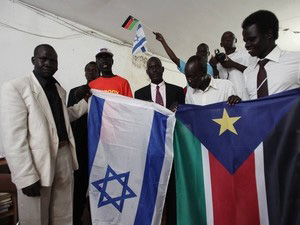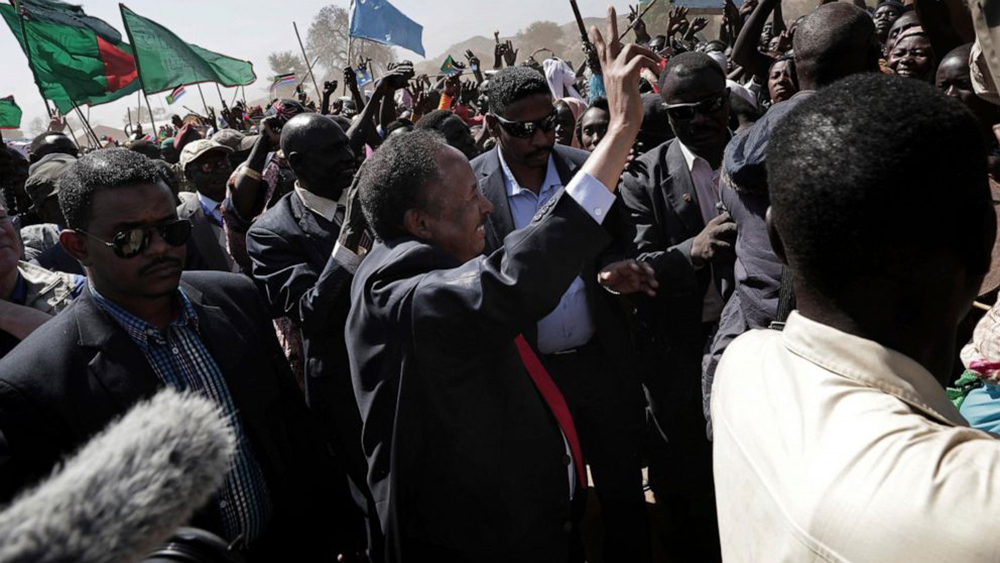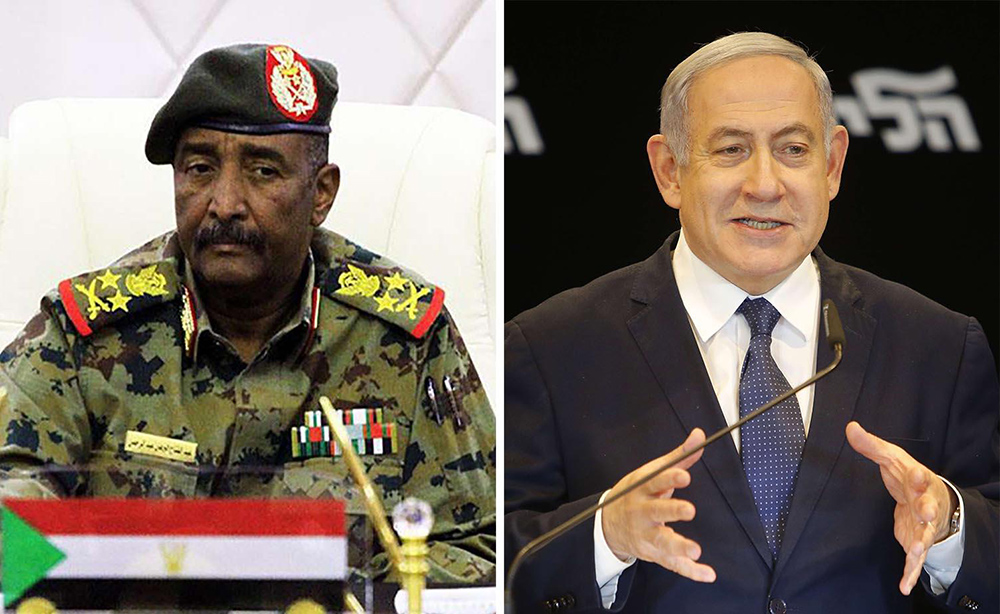Edited by: JV Staff
Israel and Sudan on Tuesday said they are close to reaching a peace agreement — setting the stage for a possible second dramatic diplomatic breakthrough for Israel with its Arab neighbors in a matter of days.
AP reported that a Sudanese Foreign Ministry official announced that his government is “looking forward to concluding a peace agreement with Israel,” drawing a pledge from Israeli Prime Minister Benjamin Netanyahu to “do all that’s needed” to wrap up a deal.
The announcements came days after Israel and the United Arab Emirates announced an agreement to establish formal diplomatic ties.
While Sudan does not have the resources and influence of the UAE, it has a far more hostile history toward Israel, according to the AP report.
Sudan hosted the landmark Arab conference after the 1967 Mideast war where eight Arab countries approved the “three no’s”: no peace with Israel, no recognition of Israel and no negotiations.
In 1993, the U.S. designated Sudan a state sponsor of terrorism in part for its support of a number of anti-Israel militant groups, including Hamas and Hezbollah.
But in recent years those hostilities have softened, and both countries have expressed readiness to normalize relations.
Sky News Arabia quoted a Sudanese Foreign Ministry spokesman as saying his government looked forward to a peace agreement “based on equality and Sudanese interests.”

“There is no reason to continue hostility between Sudan and Israel,” the spokesman, Haidar Badawi, was quoted as saying.
“We don’t deny that there are communications” with Israel, he added, saying both countries would gain much from a deal.
A Sudanese government official told The Associated Press that deliberations between Sudanese and Israeli officials have been going on for months, with help from Egypt, the UAE and the U.S.
“It’s a matter of time. We are finalizing everything. The Emirati move encouraged us and helped calm some voices within the government who were afraid of backlash from the Sudanese public,” he said, speaking on condition of anonymity because he was not authorized to brief the media.
In February, Netanyahu met Gen. Abdel-Fattah Burhan, the head of Sudan’s transitional government, during a trip to Uganda where they pledged to pursue normalization. The meeting was held secretly and only announced after the fact.
In a statement Tuesday, Netanyahu said Israel, Sudan and the entire region will benefit from a deal. “We will do all that’s needed to turn this vision into a reality,” he said.
After last week’s announcement with the UAE, Netanyahu predicted that other Arab countries would soon follow suit.
An Israeli deal with Sudan would mark a new setback for the Palestinians, who have long counted on the Arab world to press Israel to make concessions to them as a condition for normalization. That wall of Arab support had long served as one of the Palestinians’ few points of leverage against Israel.
The internationally recognized Palestinian Authority severed ties with the White House after President Donald Trump recognized contested Jerusalem as Israel’s capital in December 2017. The Palestinians have rejected Trump’s Mideast plan released early this year, which heavily favors Israel, as being unfairly biased. They have condemned the Emirati decision as treason.
With the Palestinians not speaking to the White House, the Trump administration has adopted a Mideast policy that essentially ignores them while pursuing a broader Arab-Israeli rapprochement. U.S. officials believe that Palestinians will eventually tire of isolation if they see fellow Arabs pressing ahead with improved relations with Israel and ultimately agree to negotiate a settlement, even if it means backing down on some of their most significant demands.
At the same time, Arab countries have become increasingly willing to pursue interests that come at the expense of the Palestinians. There was no immediate Palestinian comment about Sudan.
Sudan is desperate to lift sanctions linked to its listing by the U.S. as a state sponsor of terror — a key step toward ending its isolation and rebuilding its economy after the popular uprising that toppled longtime dictator Omar al-Bashir last year.

A Sudanese official had acknowledged in February that the meeting with Netanyahu was orchestrated by the United Arab Emirates and aimed at helping to remove the terror listing, which dates back to the 1990s, when Sudan briefly hosted Osama bin Laden and other wanted militants.
Under al-Bashir, Sudan was also believed to have served as a pipeline for Iran to supply weapons to Palestinian militants in the Gaza Strip. Israel was believed to have been behind airstrikes in Sudan that destroyed a convoy in 2009 and a weapons factory in 2012.
Last week’s announcement made the UAE the third Arab country to establish full diplomatic ties with Israel.
Egypt was the first, in 1979, followed by Jordan in 1994. Unofficial ties with Gulf Arab nations have also grown in recent years, fueled by shared enmity toward Iran.
A deal with Sudan could also give Netanyahu a boost at home.
Netanyahu has seen his personal popularity drop due to the coronavirus crisis, which has ravaged the Israeli economy. He also faces widespread criticism while on trial for charges of bribery, fraud and breach of trust.
Israel has long courted African support. In exchange for its expertise in security and other fields, Israel wants African states to side with it at the U.N. General Assembly and other international bodies that have long favored the Palestinians.
Israel renewed diplomatic relations with Guinea in 2016. After Netanyahu visited Chad for a renewal of ties in 2019, it was reported that Israel was working to formalize ties with Sudan.
World Israel News reported on Tuesday that the agreement for Israel and the United Arab Emirates to establish diplomatic relations may be paving the way to an Israeli-Arab military alliance in the Gulf. This was confirmed in a report on Israel’s Channel 11.
The head of the Mossad intelligence agency, Yossi Cohen, who traveled to the Emirates over the weekend for talks with Emirati officials, discussed security cooperation as part of the memorandum of understanding between the countries that is expected to be signed at the White House in the coming weeks, as was reported by WIN.
A document from the Ministry of Intelligence obtained by Channel 11 maps the possible collaborations between the two countries and the field of security appears at the top of the list.
WIN reported that the document states that the normalization agreement makes it possible to promote a military alliance between the Gulf states, including cooperation in securing the Red Sea. The water body is a strategic international shipping lane connected to the Suez Canal, but threatened at the Bab-el-Mandeb Strait by Iran-backed rebels in Yemen.
Israeli military supply companies are also interested in the Arab Gulf states to increase defense exports.
After reports in the Hebrew media indicated the peace move would allow the U.S. to sell the advanced F-35 stealth fighter jet to the Arabs, Prime Minister Benjamin Netanyahu’s office issued a firm denial, according to the WIN report.
“The peace agreement with the UAE does not include any article on the matter and the U.S. made clear to Israel that it will always make sure to protect Israel’s qualitative edge,” the statement said.
Intelligence Minister Eli Cohen said the issue of arms sales went both ways.
“Israel’s policy is to maintain its military advantage in the region. That is also our demand of the U.S. It must respect the request. The U.S. also asks us not to sell weapons we have to other countries and we respect that,” Cohen said, as was reported by WIN.
Meanwhile, WIN reported that officials in Oman said in closed talks that they would not join the normalization process with Israel due to fear of public opinion there. Omani leader Hitam bin Tarek has been in office for less than a year and is not thought to be able to make such a dramatic move at this stage, Channel 11 reported.
In related developments, WIN also reported that President Trump’s senior adviser and son-in-law Jared Kushner said Monday that Saudi Arabia should do the same as the United Arab Emirates and establish diplomatic relations with Israel.
Kushner said the Saudis joining other countries in establishing formal ties with Israel would not only help weaken Iranian influence in the region, but also be a boost for the Palestinians, as was reported by WIN.
“It would be very good for Saudi business, it would very good for Saudi’s defense, and, quite frankly, I think it would also help the Palestinian people,” Kushner told reporters during a telephone briefing.
WIN reported that in his talks over time with Crown Prince Mohammed bin Salman, Kushner said the Saudi leadership say they “want to see the Palestinian people have a state and economic opportunities.”
“It is in the interest of a lot of these countries from a security point of view and from an economic point of view to have relations with Israel,” Kushner said, emphasizing the benefits it would bring to the members of the Gulf Cooperation Council that includes the UAE, Saudi Arabia, Kuwait, Oman, Qatar and Bahrain.
“A lot of GCC countries want to have breakthroughs. The more that countries come together like Israel and the UAE… the harder it will be for Iran to divide and conquer,” Kushner said, as was reported in the WIN report.
Despite the historic Israeli-Arab animosity, the GCC countries and Israel share common fears over Iranian threats to the region, including direct threats against GCC members and Iran’s constant threat for the “total annihilation of Israel.”
“If you think about the people who don’t want Saudi Arabia and Israel to make a peace agreement, the number one opponent for that is going to be Iran,” said Kushner. “That shows that is probably the right thing to do.”
According to published reports, Iranian leaders denounced the Israel-UAE deal, with President Hassan Rouhani calling it a “big mistake” and warning “against opening the path of Israel to the region.”
Saudi Arabia has so far not commented on the announcement last week by President Trump that leaders from Israel and the UAE will meet at the White House in the coming weeks to sign what will be the third treaty with an Arab country establishing diplomatic relations, as was reported by WIN.
The Israel-UAE deal flies in the face of the Saudi-led Arab Peace Initiative that was first proposed in 2002, under which the Arab states would recognize Israel, but only after the signing of an Israeli-Palestinian peace accord that would include a complete withdrawal from Judea and Samaria and Israel accepting millions of Palestinian refugees. Israel refused the conditions.
(AP & World Israel News)
Read more at: www.worldisraelnews.com




